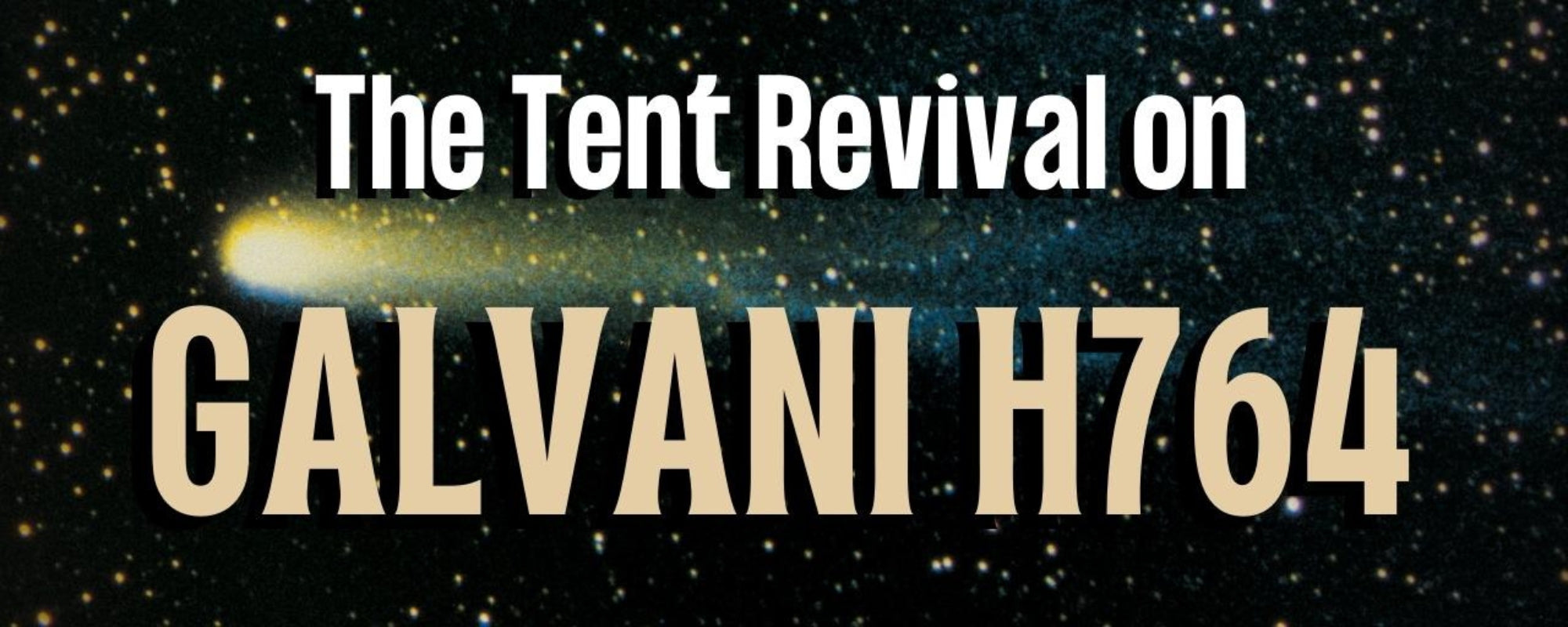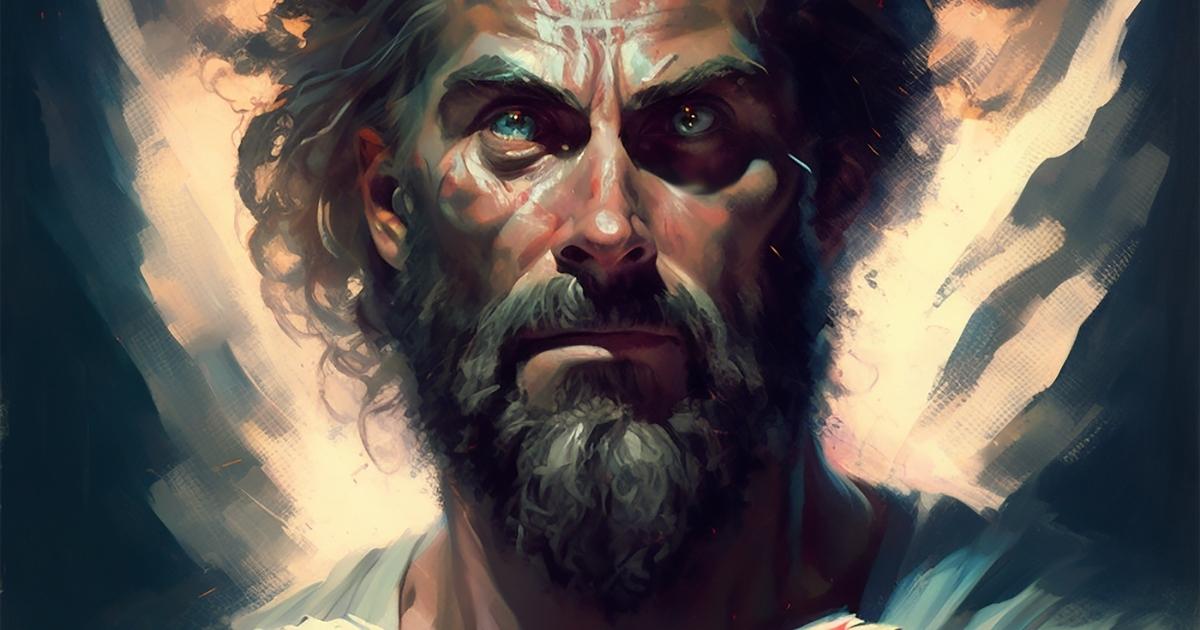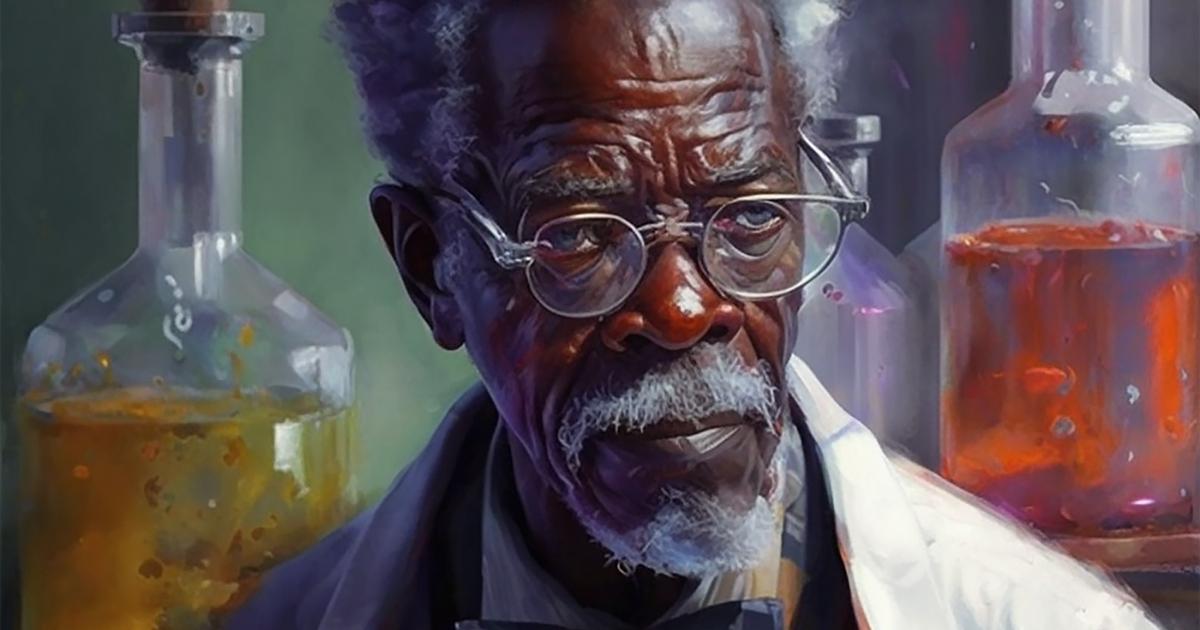

The Tent Revival on Galvani H764
By Anj Baker
Beyond asteroid H764, there were only the gas giants and their pelagic moons, and man had given up on those moons a long time ago. For all intents and purposes, H764 was the end of the universe, and everything beyond it was a lovely backdrop of other places—places that might as well have been fiction.
One not-day, on the docking station in orbit above the ’roid, a Rebecca Lynn, daughter of miners and sister to a sight-blessed preacher, hurried out of the airlock and into the hallway, her suit crumpled in her hands, like the shell of a hot air balloon. She never liked having only one door between her and the big bright empty outside. She’d ascertained the solar panels affixed to the hull of the station were all safe; the servitors who’d once done the job all but a distant memory for even the long-gone Old People. She didn’t like the station. Didn’t like Higgsian gravity. Didn’t like the air. And certainly not the big bright empty that surrounded the station, or the yellow-white light from Galvani that enveloped everything, even this far out-system. She left tomorrow to go back down to the asteroid below, and she’d already packed nearly all she owned. Her last duty of the day, before the last sleep before shore leave, was to manually check flagged images from the telescope, Thornrose.
Those from in-system had brought Thornrose as some strange, sad gift, some consolation prize, in their minds, for living this far from anything. It had another—but definitely primary—purpose, and that was to see the things that were harder to see from in-system, with all the asteroids and gas in the way. They were instructed to send pics, “if they got the chance,” which meant an irrefutable, “send pics.”
H764 was massive for a ’roid—slighty larger than the prototypical Gaian planet, with 1.2 Gs of that sweet, sweet downward acceleration. Whenever in-system reps set foot on the station when picking up the uranium, they immediately dropped to the floor because the Higgsian gravity was programmed for the locals who’d known nothing else, not to the standard. It took Rebecca Lynn a long, long time to stop cracking up whenever that happened, but the in-systemmers were nearly unfazed—unfazed by these old miners’ children laughing at them. Like these locals were just shy of subhuman. Or perhaps, subhuman entirely. Rebecca Lynn didn’t care if she was subhuman. She had too much to do.
Most of the flagged images were nothing. Most of the time, just some debris floating past the camera—how rare to get a good clear shot, with all the scattered things that orbited H764. There were some lovely ones, new angles of nebulae, of stars being borne out of clustering gas, post-supernova. She put those in a transmission to be sent in-system.
But there was one that she saved to a phys-chip that she then deleted from every single level of file. She tucked the phys-chip in a pocket and went to her cabin to finish packing.
☄
The next day, her capsule parachuted back down to the surface, and she was safe. Safe in her natural gravity. As safe as she would be. A boat, skimming across the broad, ancient oceans, picked her up and deposited her on shore, then it was a train inland to the mining town from whence she came.
Unofficial communications rarely came and went from the station, due to the massive expense, so it was with great surprise she was greeted by her brother at the town station. One of these days his sight would stop startling her.
“I saw you saw something. In the telescope. We heard about the telescope even out here. What did you see?” he asked, her shushing him the whole time. He never did listen to her, even when he cared about what she had to say.
“I saw something,” she whispered, and half-consciously touched the bag in which she’d hidden the phys-chip. “I’ll show you back home.”
The two went to his small house on the edge of town. The station-grade phys-chip was not compatible with Rebecca Lynn’s brother’s projector, but she was a skilled electrician and jerry-rigged a connection.
“That’s God,” he said flatly, once the image came on screen.
“Yeah,” said Rebecca Lynn.
“What are we going to do?” he asked, a little angry.
Rebecca Lynn, always full of ancient words, was struck dumb. “I dunno,” she said, and her miner’s daughter’s accent came back, finally. It always disappeared in the station.
“It takes you longer and longer to talk right, whenever you get back,” he said.
“Well, I won’t be going up there any more. I’ll quit. I’ll live here. I’ll find something else to do while we wait,” she said, mirroring his anger. Only now did she realize how angry she truly was.. The end of the world was finally clicking in the folds of her brain, and deep down in her limbic processes.
“Does in-system know?” he asked.
“Yes,” she said. “At least somebody does. I found files of older photographs…deep down, in the records.”
“Do we tell anyone? The end is nigh? Repent?”
“Yes,” said Rebecca Lynn.
☄
They built a tent out of a shell of a hot air balloon, and an altar of the projector. Neighbors came first, curious, and then they saw the photograph.
“Do we send out a distress signal?” asked someone, Jedidiah, who lived two kilometers down the hill.
“To who?” said Rebecca Lynn’s preacher brother. “The in-systemmers are probably already leaving.”
“They can’t leave. They can’t go fast enough,” said Rebecca Lynn to her brother. “They die with us. They go to Hell with us.”
☄
Later, Rebecca Lynn used a non-insignificant chunk of her savings to send a message up to the station.
“U see it?” she wrote, minimizing her letters, minimizing the cost, even now.
“Ye. They say don’t tell,” came the reply, a couple days later.
“Fuck u,” she sent back, and called the news station.
☄
The news station didn’t air her warning, obviously, but word of mouth brought the news to the town and the townsfolk to the preacher’s tent.
“Repent! God is here, and God is angry. God is in Tycho. God will kill us all. We have strayed too far from our home, and God is here to take us back. Repent!”
When Rebecca Lynn’s brother collapsed behind the makeshift pulpit, the spellbound crowd went feral—screaming, hollering, beating each other. Rebecca Lynn offered her brother some water that he did not accept. His eyes were directed up at the photograph and he was panting.
“You can’t see when?” she asked.
“And you can’t figure it out,” he responded and got to his feet, the clamoring crowd settling down, some to the floor, some to their seats. Others ran out the door.
“Mathematics can only say so much,” she said to his deafened ears.
“Humanity lives so far from here, around other stars, and we can never reach them. That’s what we’ve always been told. We are the refugees who fled the wrong war.”
☄
“We know,” came a message from in-system, sent printed on paper to the preacher’s door, addressed to Rebecca Lynn. “We know. That’s why we gave you Thornrose.”
Rebecca Lynn knew not what to say in reply. Should she ask how it was going over there? ‘How’s the weather? How’s the end of the world treating you?’ But she said nothing, and the letters kept coming. She stopped opening them, but her brother didn’t. He’d open the letters and follow her around the house while reading their contents aloud, reading their threats.
“They won’t do shit,” she’d say. “Won’t waste the money. It’s the end.”
“The end has always been here,” said her brother.
“Foresight’s 20/20, huh?”
He hit her, for the first time since they were children. She hit back just as hard, and they didn’t talk for several days, not even at revival.
“The world has come into existence to die. The shadow came before reality.”
☄
Rebecca Lynn spent a lot of time in the woods and the fields, hyperaware of the end of it all, loving only the prehistoric plants and Gaian creatures that lived in that thinnest habitable shell of the world that was H764. She did not love her brother, her preacher brother with all his sight. She had loved nothing but home, and she wished sometimes that the ’roid had a better name, but H764 was all it was, and maybe that was for the best. It was an impermanent name, lightly etched. Someone had always meant to name it something else.
☄
One day her brother was very strange. He said, “I love you, Rebecca Lynn. I’ll miss you.”
She stared blankly at the man now only called the preacher. “I love you too, brother mine, but I’d have loved a sister-in-law more.” They smirked at each other and didn’t even look sad, like there was continuity to the world after all.
“Did you know? That the end was coming?”
“Of course! Of course I knew the end was coming. Who didn’t? I just didn’t know when.”
“You’re a charlatan.”
“I have good ears.”
☄
When the militia of nonbelievers, hired by in-systemmers who suddenly cared about what happened on H764, came that day with their guns to shoot the end-times preacher and his sister, neither she nor he were surprised. Rebecca Lynn looked up from running the projector—for she no longer looked at the crowd; the people were too ugly—all she knew was the photograph, reflected in the glass, imprinted on the insides of her eyelids. She dreamt about it in her sleep—dreamt of the burst, the flash, the death, then Hell.
When Rebecca Lynn was shot dead looking down the barrel of a sawed-off shotgun, her last thoughts were, At least it isn’t God who kills me. At least I die at home.
On the projector screen behind her was Galvani’s nearest star, Tycho, now a dimmed and swollen red giant, a difference unrecognizable from the surface of a ’roid, but all too obvious when viewed through the lens of Thornrose. It was a pustule of gamma rays, a prescient vision of death.
Copyright © 2023 Anj Baker
The Author

Anj Baker


